Edie Melson's Blog, page 107
November 20, 2022
How Writers Can Follow the Apostle Paul's Marketing Strategy

by Karen Whiting @KarenHWhiting
Times and strategies don’t really change. Reviewing Paul’s approach gives us insights into one of the greatest missionary marketers of all time. He started with understanding his audience, figuring out ways to reach them, and sharing his testimony to the right people. Let’s examine his approach and plans.The Apostle Paul's Approach to Marketing
1. Paul knew his calling and goals
Saul became known as Paul that he is little (meaning of name Paul) in comparison to Christ. He spent three years learning to be a follower of Christ. He knew God called him to be a speaker and preach (Romans 1:1, 15:20; and 1 Corinthians 2:2).
He also knew God called him to reach as many people as possible and that meant doing whatever it took in getting out and spreading the news about Jesus. He had a goal to establish Christian communities and continue to minister to them.
2. Paul knew his audience
He knew God called him to reach the gentiles and polytheists who worshipped other gods. He understood the angry mobs who wanted to kill him since he had also tried to kill followers of Christ.
He trusted that if he shared about the sacrifice and love of Jesus that the Holy Spirit would change hearts.
3. He knew his branding.
He was called to share truth and explain the faith and lift up the name of Jesus. God confirmed that to Ananias in Acts 9:15-16. He was also called to disciple some people to carry on what he started and form communities of faith. He knew he could not do everything. He looked to the future in creating a legacy that would continue. He was more of a speaker who wrote, especially writing when he was prevented from traveling and preaching.
4. He pitched to the audience’s needs.
He used analogies his audience understood. For example, he walked around Athens until he saw the statue to an unknown god (Acts 17:23) He used that to share that he knew the real unknown God and wanted them to know too.
5. He built a tribe and made disciples.
Paul developed a following and team to keep the marketing going. He did this by encouraging them (1 Thessalonians 5:11). He encouraged his team like the Philippians to turn obstacles into opportunities. He revisited churches when he could and wrote letters to them. He sent friends to visit them and left his comrades to teach and disciple. He understood that it takes a team of people to grow the church. His letters mention many names of other workers for whom he gave thanks.
6. He shared his testimony when it would help (Acts 22 and 26).
His testimony was not his focus as his message was about Christ, His testimony became a way to share the contrast of something better than what he had strived for before he knew Jesus.
7. Paul worked at building relationships.
He interacted with Barnabus and usually had him or another follower journey with him. He invested a lot in helping Timothy become a great leader (2 Timothy 3:10). Although at one point he refused to take John Mark with him due to the young man disappointed him, they reconciled, and he later asked for him to come because he needed him.
8. Nothing stopped Paul from marketing, and he never complained that he did not like it or did not want to do it.
We may not be physically attacked over our writing and marketing, but we can feel beaten down and discouraged. With so many voices calling out to buy their book, we can feel we are drowning and living in a place where we are a minority. Bad reviews and rejections may cause us to doubt ourselves. That’s when it’s good to study Paul.He earned his own money through tent making (ACTS 18:2-3)When stoned, he got up and went back to his work (Acts 14:18-19)When in prison he rejoiced in the new opportunity to speak with guards and Romans in positions of leadership (Acts 16:22-35)He continually found audiences where he was a lone voice in a hostile environment (Acts 21:26-29).He was content even when hungry or persecuted because he was doing what God called him to do Philippians 4:11-13).
When you feel discouraged in your writing journey or the marketing, take time to study Paul and his passion for his calling.
TWEETABLEHow Writers Can Follow the Apostle Paul's Marketing Strategy from author @KarenHWhiting on @EdieMelson (Click to Tweet)
 Karen Whiting (WWW.KARENWHITING.COM) is an international speaker, former television host of Puppets on Parade, certified writing and marketing coach, and award-winning author of twenty-seven books for women, children, and families. Her newest book, The Gift of Bread: Recipes for the Heart and the Table reflects her passion for bread and growing up helping at her grandparent’s restaurant. Check out her newest book Growing a Mother’s Heart: Devotions of Faith, Hope, and Love from Mothers Past, Present, and Future. It's full of heartwarming and teary-eyed stories of moms.
Karen Whiting (WWW.KARENWHITING.COM) is an international speaker, former television host of Puppets on Parade, certified writing and marketing coach, and award-winning author of twenty-seven books for women, children, and families. Her newest book, The Gift of Bread: Recipes for the Heart and the Table reflects her passion for bread and growing up helping at her grandparent’s restaurant. Check out her newest book Growing a Mother’s Heart: Devotions of Faith, Hope, and Love from Mothers Past, Present, and Future. It's full of heartwarming and teary-eyed stories of moms.Karen has a heart to grow tomorrow’s wholesome families today. She has written more than eight hundred articles for more than sixty publications and loves to let creativity splash over the pages of what she writes. She writes for Crosswalk. Connect with Karen on Twitter @KarenHWhiting Pinterest KarenWhiting FB KarenHWhiting.
Featured Image: Photo by Luke Chesser on Unsplash
Published on November 20, 2022 22:00
November 19, 2022
Writers Can Find Peace When Entering into the Righteous Harvest

by Tammy Karasek @TickledPinkTam
The word harvest makes me think of gathering something. In my mind, I see the farmers gathering up the fruits of their labor that have ripened. During this time of year near where I used to live in Ohio, farmers have gathered their grain to store up for the winter to come. You may be asking what this has to do with writers. Stick with me and I’ll tell you what I’m thinking.
I read the following scripture and made me stop. I hadn’t put harvest and righteousness together before.
“And a harvest of righteousness is sown in peace by those who make peace.” (James 3:18 ESV)
A harvest of righteousness. The expression made me pause. I wondered about the deeper meaning of it so I dug further. I looked up the various definitions of both harvest and righteous and came up with these two short synopsis of each. Harvest: to gain, win, acquire, or use; the result of an act.Righteous: acting in an upright, moral way, virtuous.
I went back and read the scripture again and I saw something different within it. If I changed the wording a little (not changing the meaning), it taught me that we have a responsibility of harvesting righteousness. Hear me out …
A harvest (or gain, acquiring) of righteousness (by acting in an upright, moral or virtuous way) is sown in peace by those whomake peace.
This made me think about how we treat others. If you watch the nightly news, we aren’t doing so well with this of late. But I believe we need to look at our own reflection, too. Do we act righteously? Do we try to make peace? Or are we quick to critique others, or even attack them for their differences? Judgmental maybe?
I then reflected on my writing. What are the words I use in stories, blog post, comments on social media doing to show or make an effort toward peace?
As we head into this holiday season, the hustle and bustle of this time of year can sometimes raise our stress levels. More realistically, it does raise them. We can become impatient, critical or snarky . . . anyone relate? Please tell me it’s not just me.
If we want others to treat us well, we need to do the same. When we do our best to make peace, I believe more peace will be seen in our surroundings. In other words, if you want more peace, you can gather or harvest it by sowing peace to those you have an opportunity to be with.
Writers have an excellent opportunity to write encouragement and words of peace anytime we put something down in print. The holidays should be no different. If anything, we should look for more ways to lift those around us with words of cheer, encouragement to their tired souls and bring them a bit of Jesus in everything we write.
Might I suggest as we head into this wonderful time of year, we all strive to be harvesters of righteousness? May we all make (and keep) peace with those we encounter by acting in an upright, moral or virtuous way each day. Whether in person or within our written words, let us strive to bring peace to those we encounter.
And yes, even with that cranky aunt you might get stuck sitting beside at the Thanksgiving table this year!
Will you set out to be a harvester of righteousness with me?
TWEETABLEWriters Can Find Peace When Entering into the Righteous Harvest, insight from @TickledPinkTam on @EdieMelson (Click to Tweet)
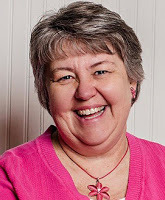 Tammy Karasek uses humor and wit to bring joy and hope to every aspect in life. Her past, filled with bullying and criticism from family, drives her passion to encourage and inspire others and give them The Reason to smile. She’s gone from down and defeated to living a “Tickled Pink” life as she believes there’s always a giggle wanting to come out!
Tammy Karasek uses humor and wit to bring joy and hope to every aspect in life. Her past, filled with bullying and criticism from family, drives her passion to encourage and inspire others and give them The Reason to smile. She’s gone from down and defeated to living a “Tickled Pink” life as she believes there’s always a giggle wanting to come out! She’s the Social Media Manager for the Blue Ridge Mountains Christian Writers Conference, Founding President and current Vice-President of ACFW Upstate SC, Founding President of Word Weavers Upstate SC. She’s a writing team member for The Write Conversation Blog, Novel Academy, and MBT Monday Devotions and others. Her work was published in a Divine Moments Compilation Book—Cool-inary Moments. When not writing Women’s Fiction and Rom-Com, she’s The Launch Team Geek helping authors launch their books and a Virtual Assistant for authors.
Published on November 19, 2022 22:00
November 18, 2022
The Three O's of a Great Scene: Objective, Opposition, Outcome

by MaryAnn Diorio @DrMaryAnnDiorio
Scenes are the lifeblood of a story. The stronger your scenes, the stronger your story.
So, how does one craft a good scene?
Scenes—like everything else in God's universe—reflect His triune nature. In other words, they work in threes. Why? Because God ordained the entire universe to work in threes.
Consider the academic disciplines. Art has three primary colors: red, yellow, and blue. Music has three primary elements: melody, harmony, and rhythm. Chemistry has three basic elements: solids, liquids, and gases. History has three periods of time: past, present, and future. Geometry has three dimensional aspects: length, width, and height. And Story has three acts: a beginning, a middle, and an end.
In our daily lives, we continually use the Rule of Three. We speak of youth, middle-age, and old age; small, medium, and large; and ready, set, go. Even some of our favorite childhood stories employ the Rule of Three: The Three Little Pigs,Three Blind Mice, and The Three Musketeers.
So, what is it about the Rule of Three that so captivates the human mind and heart? The answer is at once simple and complex.
As humans created in God's image, we, too, are wired in threes. We have a spirit, a soul, and a body. Our spirit is comprised of the conscience, the imagination, and the intuition. Our soul is comprised of the mind, the will, and the emotions. The body is comprised of soft tissue, hard tissue, and fluid.
Even the field of psychology recognizes the Rule of Three. In his insightful article, "Have Better Conversations with the Rule of Three," Dr. Karl Albrecht points out the three aspects of good communication: Questions, Declarations, and Conditionals. (https://www.psychologytoday.com/us/bl...
Even the ancients recognized the Rule of Three. There is an old Latin phrase—omne trium perfectum—that states that everything that comes in threes is perfect.
Given its universality in the grand scheme of things, the Rule of Three is something to keep in mind when writing stories. Why? Because the concept of threes naturally—and supernaturally—resonates with readers. This is the reason a story is most effective when it is built on three acts.
The same is true of a scene. When we build a scene on the three O's—Objective, Opposition, and Outcome—our scene will resonate with readers.
Let's look at each O:
Objective
The Objective of a scene is your intended goal for a scene. What do you want the scene to accomplish? What are you aiming for as you write the scene? What is your motive for writing the scene? Do you want your scene to intensify the conflict? To build suspense? To provide resolution? Or do you want your scene simply to add backstory to your character's conflict?Your objective for the scene will dictate what writing techniques you use to reach your objective for that scene.
Opposition
Without Opposition—aka conflict—you have no story. Nor do you have a scene. The best scenes are filled with conflict, both external and internal. It could be argued that internal conflict works better than external conflict in connecting your reader with your story, although this is not necessarily the case. Regardless, Opposition is crucial to your scene. Indeed, without Opposition you may not have a scene at all, but simply a vignette.
Outcome
The Outcome of a scene has to do with what you wish your scene to show or to prove to your reader. Do you want your scene to answer a question or pose a new one? Do you want your scene to add more conflict or more mystery? Do you want your scene to bring the conflict to a happy—or not-so-happy— resolution?
Interestingly, Objective, Opposition, and Outcome are interconnected and interdependent. Your scene Objective will have implications for your scene Opposition, and both your scene Objective and your scene Opposition will determine your scene Outcome.
Knowing this, it is our privilege and joy as authors, with God's help, to craft these three elements into powerful, memorable scenes that resonate with our readers and that touch their lives in meaningful ways.
TWEETABLEThe Three O's of a Great Scene: Objective, Opposition, Outcome from author @DrMaryAnnDiorio on @EdieMelson (Click to Tweet)
 MaryAnn Diorio writes riveting women's fiction from a small, quaint Victorian town in southern New Jersey where the neighbors still stop to chat while walking their dogs, the houses still sport wide, wrap-around porches, and the charming downtown still finds kids licking lollipops and old married couples holding hands. A Jersey girl at heart, MaryAnn is a big fan of Jersey diners, Jersey tomatoes, and the Jersey shore. You can learn more about MaryAnn at maryanndiorio.com.
MaryAnn Diorio writes riveting women's fiction from a small, quaint Victorian town in southern New Jersey where the neighbors still stop to chat while walking their dogs, the houses still sport wide, wrap-around porches, and the charming downtown still finds kids licking lollipops and old married couples holding hands. A Jersey girl at heart, MaryAnn is a big fan of Jersey diners, Jersey tomatoes, and the Jersey shore. You can learn more about MaryAnn at maryanndiorio.com.Featured Image: Photo by Denny Müller on Unsplash
Published on November 18, 2022 22:00
November 17, 2022
Tips for Effective Follow Up After a Writing Conference

by Crystal Bowman
Any writer who has attended a writers conference knows how exciting, informative, and inspiring they are—but they are also overwhelming and exhausting! The temptation is to rest, relax, and unwind when you get home. However, if you want to make the most of the conference, there is still much to do.
Tips to Help You Follow Up after Attending a Writing ConferenceRead through all your notes to keep things fresh in your mind. Review handouts or outlines you may have picked up during a session.If you met with an editor or agent who asked you to send a proposal, make it a top priority. Be sure you learn how to write a professional proposal, and have it edited before you send it.If an editor or agent reviewed your manuscript and asked you to send it after you’ve revised it, then get to work and revise it! When you email the manuscript, be sure to put the initials of the conference in the subject line. Write a brief email that goes something like this: Dear _____, I enjoyed meeting you at the ABCWC conference. Thank you for your interest in my work. I have made the revisions you requested and have attached the revised manuscript. I look forward to hearing from you. If an editor or agent asked for one of your stories that they reviewed at the conference, email it at once. Be sure to put the initials of the conference in the subject line and write a brief note in the body of the email reminding them who you are. Many conferences offer the full conference (key notes and workshops) on a flash drive. Purchasing it is worth the investment.You probably came home with a stash of business cards! Be open to networking with authors you met at the conference as it will widen your circle of writers and be mutually beneficial. Keep business cards in a place where you can easily access them. Review the cards to help you remember who these people are—it’s easy to forget! And when time allows, send emails to the people you connected with personally. The Bottom Line
Editors and agents come to writers conferences looking for new talent. Since most of them travel to the conference (many by air), they don’t want to be bogged down with stacks of manuscripts and prefer that writers send them in an email after the conference. The writers who follow up quickly, are more likely to stay connected with the editors or agents they met with.
In September, I met one-on-one with seventeen writers at a conference and gave them my email so they could send me their work to review. I have only heard from four of them and only two are ready to submit their proposals. Writer’s conferences are a wise investment if you want to improve your writing skills and open doors to new opportunities. But if you want the best return on your investment, following up is the key.
TWEETABLETips for Effective Follow Up After a Writing Conference, from author Crystal Bowman on @EdieMelson (Click to Tweet)
 Crystal Bowman is an award-winning, bestselling author of more than 100 books for children and four nonfiction books for women. She also writes lyrics for children’s piano music and is a monthly contributor to Clubhouse Jr. Magazine. She loves going to schools to teach kids about poetry. She also speaks at MOPS (Mothers of Preschoolers) groups and teaches workshops at writers’ conferences. When she is not writing or speaking, she enjoys going for walks, working out at the gym, and eating ice cream. She and her husband live in Michigan and have seven huggable grandkids.
Crystal Bowman is an award-winning, bestselling author of more than 100 books for children and four nonfiction books for women. She also writes lyrics for children’s piano music and is a monthly contributor to Clubhouse Jr. Magazine. She loves going to schools to teach kids about poetry. She also speaks at MOPS (Mothers of Preschoolers) groups and teaches workshops at writers’ conferences. When she is not writing or speaking, she enjoys going for walks, working out at the gym, and eating ice cream. She and her husband live in Michigan and have seven huggable grandkids. WWW.CRYSTALBOWMAN.COMWWW.FACEBOOK.COM/CRYSTAL.BOWMANWWW.FACEBOOK.COM/CRYSTALJBOWMANWWW.INSTAGRAM.COM/CRYSTALBOWMANAUTHOR
Featured Image: Photo by Kaleidico on Unsplash
Published on November 17, 2022 22:00
November 16, 2022
How to Stay Healthy & Sell More Books During the Holidays
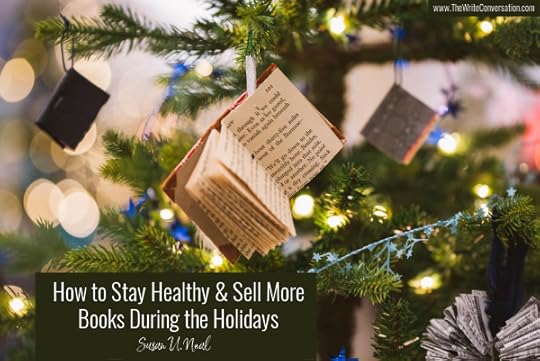
by Susan U. Neal RN, MBA, MHS @SusanNealYoga
The holidays are an exciting but stressful time of year. Stores bustle with shoppers who hurry around to get things checked off their list. By December, we all end up rattled and worn out. However, we can successfully navigate the season to healthy during the most joyous time of the year and conduct book signings to sell more books during the busiest time of the year.
Shop Early
In December, stores are packed, items run low, and parking lots are full, which makes shopping a nerve-wracking experience. Instead, purchase gifts for your family and friends early. Create a list of everyone you need to buy for, and as you purchase gifts, cross them off your list. Finish your shopping before the Thanksgiving holidays, so your holiday stress is lessened. If you still need to purchase a few items in December, order them online to avoid the crowds.
Schedule Holiday Book Events
Schedule book events at local bookstores during this busy season. During the month of December, shoppers scramble to buy items to finish their gift-giving list. Give them every reason to purchase from you by conducting a book signing.
Last year, when I did a book signing at Barnes & Noble the Sunday before Christmas, I sold over $500 worth of books in two hours. Buyers were eager to finish their shopping with a useful gift like a book. And the author can easily explain why this gift is perfect for their loved one.
Here are some book signing tips:Bring several pensSign your name on the title page of your bookAsk the buyer to spell the name of the person who the book is forInsert your bookmarkTake pictures of your event when you arrive and post on social mediaTag the bookstore on your social media postHold a drawing with some door prizes to collect emails (be sure to get permission to add them to your email list)Bring some water as you may get thirsty
Stay Healthy During the Holidays
To stay healthy during the holidays you need to exercise but your time is limited. Park your car further away from a store, so you walk more. Climb the stairs instead of taking the elevator. While talking on the phone, get up and walk around. You can really clock in some miles while talking. Check your smart phone for the number of steps you walked and meet a daily goal you created for yourself.
At holiday parties, avoid the unhealthy items and eat nuts, vegetables, and fruits. Dip those veggies in healthy dips like guacamole and hummus. These foods are just as delicious, and they won’t contribute to brain fog. Be sure not to overeat. Using a smaller plate may help. At potlucks, bring a healthy item like a broccoli salad with fresh pomegranate.
When you eat healthy during the holidays, your energy level remains high so you can keep upwith a multitude of tasks. The last thing you need is fatigue because of a poor diet.
Focus on the Reason for the Season
If you get your shopping done early you won’t get caught up in the hustle and bustle of the Christmas season. Instead of fighting the crowds, enjoy time with your family and focus spiritually on the birth of Jesus Christ.
When we stay centered on the reason for the season, we experience the joy of the holidays. Read through the Christmas story and count the number of angelic visits surrounding Jesus’s birth. It will surprise you how many you find. Read these Bible verses with your family in the following chronological order: Luke 1: 5–39, 56; Matthew 1: 20; Luke 2: 1–14; and Matthew 2:1–22.
You can be peaceful during the holidays while everyone else runs around checking everything off their list, by preparing early and focusing on the celebration of the birth of Jesus Christ. This year prepare early, stay healthy, and enjoy the season.
TWEETABLEHow to Stay Healthy & Sell More Books During the Holidays, insight from author and fitness expert @SusanNealYoga on @EdieMelson (Click to Tweet)
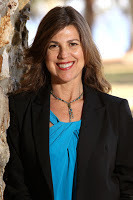 Susan U. Neal, RN, MBA, MHS: Susan’s mission is to improve the health of the body of Christ. She has her RN and MBA degrees, as well as a master’s in health science. She is a CERTIFIED HEALTH AND WELLNESS COACHwith the American Association of Christian Counselors. She published five books, the Selah award winner 7 STEPS TO GET OFF SUGAR AND CARBOHYDRATES, CHRISTIAN STUDY GUIDE FOR 7 STEPS TO GET OFF SUGAR AND CARBOHYDRATES, HEALTHY LIVING JOURNAL, SCRIPTURE YOGAa #1 Amazon best-selling yoga book, and YOGA FOR BEGINNERSwhich ranked #3. She published two sets of Christian Yoga Card Decks and two Christian Yoga DVDs that are available at CHRISTINAYOGA.COM. Her digital product HOW TO PREVENT, IMPROVE, AND REVERSE ALZHEIMER’S AND DEMENTIA is a great resource. To learn more about Susan visit her website SUSANUNEAL.COM You can also connect with Susan on FACEBOOK, TWITTER, and INSTAGRAM.
Susan U. Neal, RN, MBA, MHS: Susan’s mission is to improve the health of the body of Christ. She has her RN and MBA degrees, as well as a master’s in health science. She is a CERTIFIED HEALTH AND WELLNESS COACHwith the American Association of Christian Counselors. She published five books, the Selah award winner 7 STEPS TO GET OFF SUGAR AND CARBOHYDRATES, CHRISTIAN STUDY GUIDE FOR 7 STEPS TO GET OFF SUGAR AND CARBOHYDRATES, HEALTHY LIVING JOURNAL, SCRIPTURE YOGAa #1 Amazon best-selling yoga book, and YOGA FOR BEGINNERSwhich ranked #3. She published two sets of Christian Yoga Card Decks and two Christian Yoga DVDs that are available at CHRISTINAYOGA.COM. Her digital product HOW TO PREVENT, IMPROVE, AND REVERSE ALZHEIMER’S AND DEMENTIA is a great resource. To learn more about Susan visit her website SUSANUNEAL.COM You can also connect with Susan on FACEBOOK, TWITTER, and INSTAGRAM.
Published on November 16, 2022 22:00
November 15, 2022
The Filters a Writer Uses to See the World Can Bring Our Readers Peace and Hope

by Katy Kauffman @KatyKaffman28
Diamonds danced on the water as light and wind teased the waves. I squinted under the summer sun for as long as I could, resisting the urge to put on my sunglasses. I didn't want anything to obstruct my view of the ocean. Shades of seafoam green and teal mixed as I gazed at the water. But the sun won out.
Surprise! My sunglasses didn’t diminish the view—they enhanced it. With no more glare, I could see the ocean clearly, and the brown tint of my lenses enhanced the beauty already present. When I thought my view of the ocean would be diminished, it actually became better.
As we go through life, we may try to make sense of the landscape without any aid. We may struggle to observe the beauty and the hardships for what they are, squinting as best as we know how. Some people may choose a “filter,” or perspective, through which they see life. Their filter may be “I’ll make it on my own no matter what.” Or they may choose “No one is ever going to hurt me again.” But that way of seeing things can often leave us frustrated and angry. Or desperate.
What is God’s filter? How can we process life—and write about it—with the right perspective? How can we see the world from God’s viewpoint and give others hope?
The Filters that Bring Wisdom & Peace
These filters help us to see clearly and to know how to process life, so we can flourish in God’s wisdom and peace, instead of trying to make it on our own. Are you wearing these sunglasses today? Which filter would help you to handle life right now and write about it?“The goodness of God endures continually” (Psalm 52:1 NKJV).“All things work together for good to those who love God” (Romans 8:28 NKJV). “In the multitude of my anxieties within me, Your comforts delight my soul” (Psalm 94:19 NKJV). “This is eternal life, that they may know You, the only true God, and Jesus Christ whom You have sent” (John 17:3 NKJV).“For He satisfies the longing soul, and fills the hungry soul with goodness” (Psalm 107:9 NKJV).
When we can filter life through these truths, we see what God can do in a situation, and we have hope. We know how to write about life’s challenges and direct our readers to a Hero who can handle anything.
The goodness of God. His comforts. Knowing Him. With a heart satisfied by Him. This is how we can go through life with hope and write about the hope we find in God and His Word.
Is there a Bible verse above or one hidden in your heart that helps you to process life? Share that encouragement in the comments, and may God’s truths and promises always be the filter that enhances the beauty He can create in any difficulty.
TWEETABLEThe Filters a Writer Uses to See the World Can Bring Our Readers Peace and Hope, insight from author @KatyKauffman28 on @EdieMelson (Click to Tweet)
 Katy Kauffman is an award-winning author, an editor of Refresh Bible Study Magazine, and a co-founder of LIGHTHOUSE BIBLE STUDIES. She loves connecting with writers and working alongside them in compilations, such as Feed Your Soul with the Word of God, Collection 1 which is a 2020 Selah Awards finalist. She also enjoys encouraging writers and giving writing tips in her monthly writers’ newsletter called THE LIGHTHOUSE CONNECTION.
Katy Kauffman is an award-winning author, an editor of Refresh Bible Study Magazine, and a co-founder of LIGHTHOUSE BIBLE STUDIES. She loves connecting with writers and working alongside them in compilations, such as Feed Your Soul with the Word of God, Collection 1 which is a 2020 Selah Awards finalist. She also enjoys encouraging writers and giving writing tips in her monthly writers’ newsletter called THE LIGHTHOUSE CONNECTION.In addition to online magazines, Katy’s writing can be found at CBN.COM, thoughts-about-God.com, and three blogs on writing. She loves to spend time with family and friends, create art and make crafts with her group MY ARTSY TRIBE, and tend the garden in the morning sun. She makes her home in a cozy suburb of Atlanta, Georgia. Connect with her on FACEBOOK and TWITTER.
Published on November 15, 2022 22:00
November 14, 2022
Remembering A Writer's Harvest
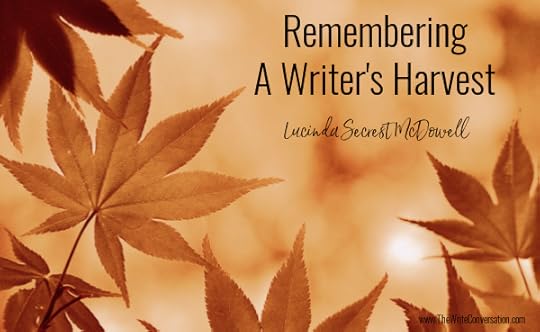
by Lucinda Secrest McDowell @LucindaSMcDowel
In November we are inevitably surrounded by cornucopia, pumpkins and gourds, and fabulous autumn root vegetables. I love Harvest. I love the colors, the smells, the textures, and “sweatah weathah.”
I love focusing on praise and thanksgiving. This morning for some inexplicable reason I awakened singing that wonderful old hymn “Bringing in the Sheaves.”
Sowing in the morning, sowing seeds of kindness,Sowing in the noontide and the dewy eve;Waiting for the harvest, and the time of reaping,We shall come rejoicing, bringing in the sheaves. ~ Knowles Shaw, 1874
As a writer/speaker, where have you been sowing this year? Training at conferencesCreating weekly blogsLaunching a website Building a platformWriting book proposalsResearch and journalingPreparing speaking presentationsNetworking with industry professionals
Are you exhausted, exhilarated, or perhaps even exasperated? Perhaps you are still “waiting for the harvest and the time of reaping,” and yet nothing seems to be happening.
How does a writer get from sowing to “rejoicing, bringing in the sheaves” when there are no sheaves to rejoice over yet?
This is not the first Autumn where I have looked around and wondered when all the fruit of my year’s labor would appear. How can I choose to rejoice anyway?
Prolific writer/speaker Beth Moore answered that question for me on Instagram this past hot summer. She is evidently in the process of trying to grow a vineyard in Texas and one day she posted that the only fruit in her whole field was one measly grape! Not much for all her efforts and care as a gardener.
Yet Beth pointed her readers to the fact that Jesus doesn’t always measure our fruit from the sheer volume of the sheaves that are harvested. “And in those one-lone-grape seasons or those seasons of none at all, maybe He also says to us, ‘I love you. Way to simply stay alive through this. Hold on and hang in there. There’s a different season coming.’”
I don’t know whether you are in the midst of reaping and rejoicing or waiting and withering; but I do know there is always a different season coming. Hold on and hang in there.
Let us not become weary in doing good, for at the proper timewe will reap a harvest if we do not give up. Galatians 6:10
Writer friends, thank you for sowing seeds of kindness and for doing good. For the Master. Perhaps you can even hear my twangy voice singing this last verse over you as a prophetic benediction:
Going forth with weeping, sowing for the Master,Though the loss sustained our spirit often grieves;When our weeping's over, He will bid us welcome,We shall come rejoicing, bringing in the sheaves. Amen.
TWEETABLERemembering a Writer's Harvest, encouragement from author @LucindaSMcDowel on @EdieMelson (Click to Tweet)
 Lucinda Secrest McDowell, M.T.S., is a storyteller and seasoned mentor who engages both heart and mind while “Helping You Choose a Life of Serenity & Strength.” A graduate of Gordon-Conwell Theological Seminary and Furman University, McDowell is the author of 17 books and contributing author to 36+ books. Her award-winning books include Soul Strong, Life-Giving Choices, Dwelling Places, and The Courage to Write. Lucinda, a member of the Redbud Writers Guild and AWSA, received Mt. Hermon “Writer of the Year” award and guest blogs monthly for ‘The Write Conversation.’
Lucinda Secrest McDowell, M.T.S., is a storyteller and seasoned mentor who engages both heart and mind while “Helping You Choose a Life of Serenity & Strength.” A graduate of Gordon-Conwell Theological Seminary and Furman University, McDowell is the author of 17 books and contributing author to 36+ books. Her award-winning books include Soul Strong, Life-Giving Choices, Dwelling Places, and The Courage to Write. Lucinda, a member of the Redbud Writers Guild and AWSA, received Mt. Hermon “Writer of the Year” award and guest blogs monthly for ‘The Write Conversation.’ Whether pouring into young mamas, leading a restorative day of prayer, or coaching writers and speakers through “Encouraging Words Consulting,” she is energized by investing in people of all ages. As a communications teacher, she co-directs “reNEW—spiritual retreat for writers & speakers” and has served on the faculty of Speak Up Conference, Mount Hermon Christian Writers Conference, Blue Ridge Mountains Christian Writers Conference, Florida Christian Writers Conference, Asheville Christian Writers Conference, and She Writes for Him. Known for her ability to convey deep truth in practical and winsome ways, McDowell shares words from “Sunnyside” cottage in New England and blogs weekly at WWW.LUCINDASECRESTMCDOWELL.COM
Published on November 14, 2022 22:00
November 13, 2022
What to Do When An Author's Podcast Pitch Isn't Working

by Patricia Durgin @PatriciaDurgin
No matter how dignified we are, holding our just-published book in our hands for the first time makes us squeal with glee, and rightly so.
We’ve heard that the fastest way to “get the word out” is via interviews, so we visit social media groups and share our availability. Here’s where our momentum often stops cold.
Our approach is, shall we say…lacking? Isn’t it enough to reveal that we’re ready to be interviewed? Uh, no.
Recently I read a Facebook post by Max, “My book is hot off the presses! I’m ready to be interviewed. My topic is XYZ. I look forward to hearing from you.” That was his entire "pitch."
Experienced podcasters won’t reach out to Max, and he’ll never know why.
Though he didn’t realize it, Max practiced passive marketing...an announcement to the world at large that he was available for interviews, expecting that same world to run to his door, eager to help him reach his goals. This is an easy trap for anyone.
The world isn't trying to help us reach our goals. They're busy trying to reach their own goals. They're on the lookout for guests who will help them.
We're wise to remember that hosts who interview us give us a GIFT…access to their audience. They’ve built that audience by serving them well, developing deep relationships and thus earning their listeners’ trust. Astute hosts do not take that trust lightly.
The burden is on us to identify how we can help them serve their audience.
3 Steps to Significantly Increase Your Pitch’s Odds
1. Make a list of 10-20 podcasts: Research podcasts that serve the same / similar audience as yours OR who discuss the same / similar topic as yours. Do they host guests? Who have they recently interviewed? How might you be able to add to that discussion by offering a deeper perspective, an opposing view, or different (yet still helpful) information?
2. Analyze the podcast: Listen to 3-5 full episodes. Is the host well-prepared, or do they work off-the-cuff? Is their program live or recorded, and which fits your communication style best? Does the audience participate live? How long is the program, and do guests (you) stay on the entire time, or only for a segment?
Do their guests teach the audience how to do something or is their book the primary topic? Do they allow guests to offer a Lead Magnet: a short, free resource the podcaster's audience will need to sign up for, thus growing your email list?
You want to be knowledgeable about the program, the audience, and the host’s goals for the program. Is there a gap you can fill? Point that out...graciously. :)
Write a review for at least one episode, give it time to be published, take a screenshot of it and add that to your pitch email.
3. Write your pitch: Keep it short and on point. If you’re pitching via email, be clear. Podcast Guest Pitch is a great title. Bonus points for adding a value phrase or keywords.
Have you met the host? Mention it and move on.
Don't be vague. Tie your message into the program’s main topic. What can you add to the conversation, and how will your contribution benefit the audience? You’re there to help the podcast host serve his or her audience. How can you do that, specifically?
Add your website and Media Kit links. If you’ve been interviewed before, add 2-3 of those links. This helps the podcaster know what to expect if they invite you.
Be sure to ask to be interviewed. Surprisingly, not everyone does.
Above All, Keep Pitching!
Repeat the steps above often. As potential hosts respond (not all will), make a note of their questions or comments.
Questions can mean you’ve left out information they want before deciding, or they’re intrigued and want to confirm you’ll be a good fit. Respond professionally, don’t over-promise, and if you’re not sure about something, simply say so.
If their answer is “no,” decide whether to keep them on your list. Today’s “no” might mean “never,” but it could also be a "yes" tomorrow. If you sense you’re a natural fit but the host doesn’t see it yet, follow up without harassing them. They may have had a bad day when you originally contacted them.
Podcasters are human, too, or so I’m told. :)
TWEETABLEWhat to Do When An Author's Podcast Pitch Isn't Working, tips from @PatriciaDurgin on @EdieMelson (Click to Tweet)
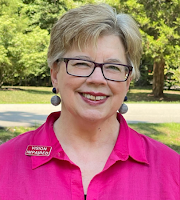 Patricia Durgin loves clarity! It's her honor to serve Christian writers and speakers who are on fire for Jesus but who—whether beginners or advanced—lack the clarity to market their message beyond their family and friends. As a recognized marketing coach and strategist, Patricia serves via one-on-one and small group coaching, online courses, and a private Facebook group for Christian communicators. She contributes monthly columns to The Write Life, Almost an Author, and as of this article, The Write Conversation. Yay!
Patricia Durgin loves clarity! It's her honor to serve Christian writers and speakers who are on fire for Jesus but who—whether beginners or advanced—lack the clarity to market their message beyond their family and friends. As a recognized marketing coach and strategist, Patricia serves via one-on-one and small group coaching, online courses, and a private Facebook group for Christian communicators. She contributes monthly columns to The Write Life, Almost an Author, and as of this article, The Write Conversation. Yay! Though Patricia's vision impaired, Jesus sends her on grand adventures across the country, all to serve Him. Don't worry...He sends the help she needs. One day that might be you!
Connect with Patricia at MARKETERSONAMISSION.COM
Published on November 13, 2022 22:00
November 12, 2022
The Real ID for Us as Writers

by Martin Wiles @LinesFromGod
Getting the real ID proved difficult.
My wife and I decided to get our CWP (Concealed Weapons Permit) for peace of mind. After completing the class, we had to send our fingerprints and other documents to SLED to receive our permit. The only trouble was, my wife and I had moved several months before and needed to change our address with the Department of Motor Vehicles.
Down to the DMV, we went. But first, we had to make an appointment (courtesy of COVID). So, we checked their website to see what documents we needed. Since the government would require everyone to have a real ID by a particular month and year, we decided to get ours while there.
We thought we had everything in order. But two trips later, we discovered we didn’t. The documents we brought, they wouldn’t take. After much aggravation, we decided to put off the real ID and update our address in the state’s system. We merely wanted our CWP to come to the correct address. Although the DMV employee took my word that I lived at a particular address, my word wasn’t sufficient for the real ID.
Knowing our identity is one of the early crises we must work through. I watch around one hundred middle schoolers try to determine theirs each year. Not working this out early in life can lead us to wander in various directions while never being satisfied with anything we do or have. We change jobs, careers, spouses, cars, houses, or play toys.
We writers can face the same dilemma. At one of the first writer’s conferences I attended, the organizer made us all say, “I am a writer.” Sure, we were other things too—teachers, editors, retirees, wanderers, engineers—but we were writers at the core of our beings.
Some wrote part-time while others made a full-time career from it, but we all wrote the genre God had called us to write. When we don’t write, the words burn in our souls as a fire in our bones. We must let them out. It’s what we do; it’s who we are.
Our publication credits shouldn’t matter. That varied, too. Some had a long list of accomplishments, while others had none. Some were far along in the journey, while others had just begun. The variations didn’t matter. We were . . . are writers.
But we have an identity that far surpasses the writer one: “For God bought you with a high price. So you must honor God with your body” (1 Corinthians 6:20 NLT).
At the core of our being, we belong to God. He created us and wants us to enter a relationship with Him so that we become His child personally, not just by default through creation. He bought us with a price: the blood of His Son.
Once we enter this relationship, everything else makes sense and falls into place. We find peace in what we do, our relationships, and what we possess. Everything beyond the relationship serves as an extra to bring added happiness.
We will live at peace—with ourselves and others. The need to compete, get ahead, and do whatever it takes to be number one falls by the wayside. Instead, we do our best at whatever God gives us to do. We have unearthed our real ID. And we don’t need a document in our wallet to remind us.
If you haven’t discovered your real ID, let God show you whom he created you to be.
TWEETABLEThe Real ID for Us as Writers, insight from author Martin Wiles, @LinesFromGod on @EdieMelson (Click to Tweet)
 Martin Wiles is the founder of Love Lines from God (www.lovelinesfromgod.com) and serves as Managing Editor for Christian Devotions, Senior Editor for Inspire a Fire, and Proof Editor for Courier Publishing. He has authored six books and has been published in numerous publications. His most recent book, DON'T JUST LIVE...REALLY LIVE, debuted in October of 2021. He is a freelance editor, English teacher, author, and pastor.
Martin Wiles is the founder of Love Lines from God (www.lovelinesfromgod.com) and serves as Managing Editor for Christian Devotions, Senior Editor for Inspire a Fire, and Proof Editor for Courier Publishing. He has authored six books and has been published in numerous publications. His most recent book, DON'T JUST LIVE...REALLY LIVE, debuted in October of 2021. He is a freelance editor, English teacher, author, and pastor.
Published on November 12, 2022 22:00
November 11, 2022
Eight Reasons for Writers to Choose Gratitude Every Day

by Beth K. Vogt @BethVogt
I’ve been bookending my days with hope and gratitude.
I start my days reading the book You’ll Get Through This by Max Lucado, which focuses on the life of Joseph. Lucado started with this challenge:
“Rather than ask God to change your circumstances, ask him to use your circumstances to change you. Life is a required course. Might as well do your best to pass it.”
I end my days with the book Choosing Gratitude: Your Journey to Joy by Nancy Leigh DeMoss. She asks the question: Is the gratitude that flows out of your life as abundant as the grace that flows into your life?”
Hope and gratitude are steadying influences on my days. Circumstances change, my emotions fluctuate, but focusing on hope and gratitude surrounds each day with positivity.
Recently in Choosing Gratitude, I read eight reasons to be grateful. As we move toward Thanksgiving Day, I thought I’d share those eight reasons with you:
1. Gratitude is a matter of obedience: The theme of gratitude runs through the entire book of Colossians, which happens to be one of my favorite books of the Bible. Consider Colossians 3:17 (NASB), which says, “Whatever you do in word or deed, do everything in the name of the Lord Jesus, giving thanks through Him to God the Father.”2. Gratitude draws us close to God: Being grateful allows us to be close to God. Isn’t that a wonderful truth? “Let us come before His presence with thanksgiving, let us shout joyfully to Him with psalms.” Psalm 95:2 (NASB)3. Gratitude is a sure path to peace: So many people I know are seeking peace right now, and even more so as we enter the hectic holiday season. Consider this familiar passage: “Be anxious for nothing, but in everything by prayer and supplication with thanksgiving let your requests be made known to God. And the peace of God, which surpasses all comprehension, will guard your hearts and minds in Christ Jesus.” (Philippians 4:6-7) Sometimes when I pray, I tell God what I want, but I skip telling him why I’m thankful. What about you?4. Gratitude is a gauge of the heart: Until now, I’d never considered how ingratitude is an indicator of my heart-health. “Surely the righteous will give thanks to Your name; The upright will dwell in Your presence.” (Psalm 140:13)5. Gratitude is the will of God: “… in everything give thanks; for this is God’s will for you in Christ Jesus.” (1 Thessalonians 5:18) If we’re ever wondering what God’s will is for our lives, we can always start with gratitude. 6. Gratitude is an evidence of being filled with the Holy Spirit: “… always giving thanks for all things in the name of our Lord Jesus Christ to God, even the Father …” (Ephesians 5:20) This verse is found in Ephesians 5, that starts with the verse “to be imitators of God” and then continues to describe how to be filled with the Spirit.7. Gratitude reflects Jesus’ heart: Jesus constantly gave thanks. He gave thanks at the tomb of Lazarus (John 11:41); at the return of the 70 disciples (Luke 10:21); at mealtime (Mark 8); and when facing suffering (Luke 22:17), (Luke 22:19), (Matthew 26:27). 8. Gratitude gets us ready for heaven: When we read the book of Revelation, we see worship will include giving thanks. Consider Revelation 11:17 (NASB): “… We give thanks, O Lord God, the Almighty, who are and who were, because You have taken Your great power and begun to reign.”Which one of these eight reasons to choose gratitude motivates you today?
TWEETABLEEight Reasons for Writers to Choose Gratitude Every Day, insight from author @BethVogt on @EdieMelson (Click to Tweet)
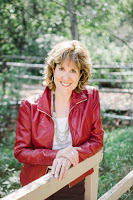 Beth K. Vogt believes God’s best often waits behind the doors marked “Never.” Having authored nine contemporary romance novels and novellas, The Best We’ve Been, the final book in Beth’s Thatcher Sisters Series with Tyndale House Publishers, releasers May 2020. Other books in the women’s fiction series include Things I Never Told You, which won the 2019 AWSA Award for Contemporary Novel of the Year, and Moments We Forget. Beth is a 2016 Christy Award winner, a 2016 ACFW Carol Award winner, and a 2015 RITA® finalist. An established magazine writer and former editor of the leadership magazine for MOPS International, Beth blogs for Learn How to Write a Novel and The Write Conversation and also enjoys speaking to writers group and mentoring other writers. Visit Beth at bethvogt.com.
Beth K. Vogt believes God’s best often waits behind the doors marked “Never.” Having authored nine contemporary romance novels and novellas, The Best We’ve Been, the final book in Beth’s Thatcher Sisters Series with Tyndale House Publishers, releasers May 2020. Other books in the women’s fiction series include Things I Never Told You, which won the 2019 AWSA Award for Contemporary Novel of the Year, and Moments We Forget. Beth is a 2016 Christy Award winner, a 2016 ACFW Carol Award winner, and a 2015 RITA® finalist. An established magazine writer and former editor of the leadership magazine for MOPS International, Beth blogs for Learn How to Write a Novel and The Write Conversation and also enjoys speaking to writers group and mentoring other writers. Visit Beth at bethvogt.com.
Published on November 11, 2022 22:00



